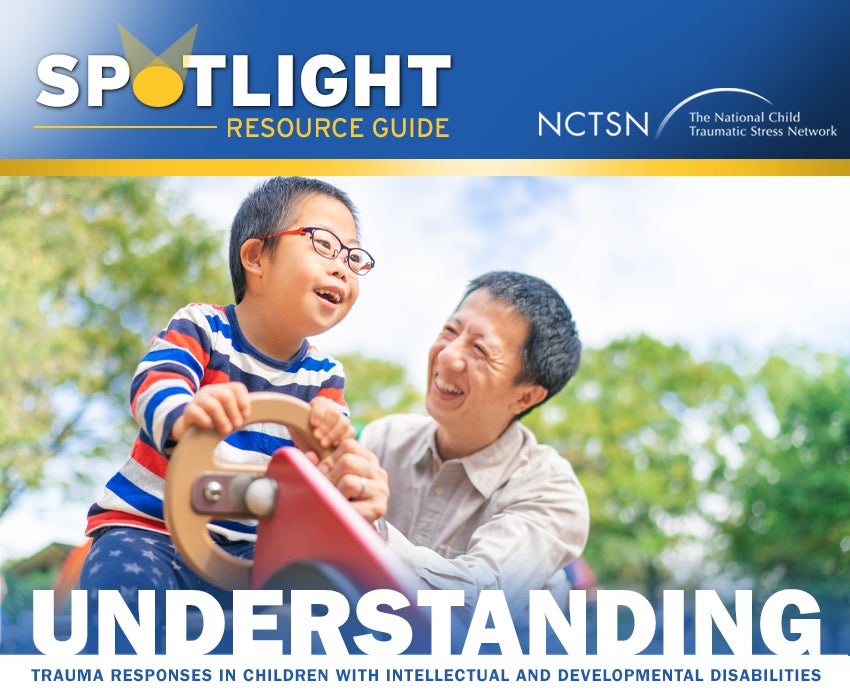
Research indicates that youth living with intellectual and developmental disabilities (IDD) experience exposure to trauma at a higher rate than their non-disabled peers. Children with IDD appear to be at an increased risk for physical abuse, physical restraint and seclusion, sexual abuse, and emotional neglect. In addition, psychological distress from medical procedures is more common among children living with IDD than their non-disabled peers. This is because they may also have long-term health problems that require surgeries and other serious treatments. When trauma occurs with children and families with IDD, it is challenging to effectively address the psychological impact of the event. Sometimes the connections between symptoms and trauma are missed when behaviors are attributed to a child’s IDD. Overshadowing is a term that describes when the trauma responses of children are inaccurately assumed to be caused by their IDD diagnosis. The NCTSN has resources to help caregivers and providers understand trauma responses in children with IDD and to provide support.
![]()
Children with Intellectual and Developmental Disabilities Can Experience Traumatic Stress: A Fact Sheet for Parents and Caregivers
Offers parents and caregivers information about how children with intellectual and developmental disabilities (IDD) experience traumatic stress. This fact sheet provides information on the intersection of IDD, trauma, and mental wellness; what intellectual and developmental disabilities are; how trauma might impact children with IDD; why children with IDD are at higher risk for trauma exposure; and how trauma service providers should partner with parents and caregivers. Also available in Spanish.
![]()
Understanding Trauma Responses in Children with Intellectual and Developmental Disabilities and When to Seek Help
Outlines what responses to trauma could look like in children with IDD. This fact sheet discusses how a child with IDD might respond to traumatic or stressful experiences, how a caregiver's response to the child's behavior may influence recovery, what a trauma reminder is, common responses to a traumatic event, and when to seek help.
![]()
Choosing Trauma-Informed Care for Children with Intellectual and Developmental Disabilities: A Fact Sheet for Caregivers
Provides information for caregivers on choosing trauma-informed care for children with IDD. This fact sheet outlines how to find mental health care for children with IDD, what to ask when you contact a provider, how to determine if your child is getting the trauma-informed care they need, and discuss what partnership in trauma-informed care means.
![]()
Trauma and Children with Intellectual and Developmental Disabilities: Taking Care of Yourself and Your Family
Offers guidance on the importance of taking care of oneself while parenting children with IDD. This fact sheet discusses reactions caregivers may have to their child's negative experiences and traumas, acknowledges that taking care of oneself at times feels impossible, and self-care activities and tools.
![]()
The Impact of Trauma on Youth with Intellectual and Developmental Disabilities: A Fact Sheet for Providers
Provides information on the impact that trauma may have on youth with intellectual and developmental disabilities (IDD). This fact sheet offers providers information on IDD and trauma, communication and trauma-related behavior, IDD and systems of care, screening and assessment for youth with IDD, diagnostic criteria, treatment, and resilience and recovery for youth with IDD who have experienced trauma. Also available in Spanish.
![]()
Tailoring Trauma-Focused Cognitive Behavior Therapy for Children with IDD
Presents a formal model based on a “matrix” of TF-CBT steps and will also provide recommendations for treatment structure, process, and supplemental resources from the IDD/autism literature. This webinar starts with the issue of bias and “diagnostic overshadowing” in the assessment of IDD/Trauma cases, including the importance of child self-report and the current state of the literature in this area. Clinical case examples will illustrate the steps and approach.
![]()
Children with Intellectual and Developmental Disabilities Who Have Experienced Trauma
Provides clinicians with the foundational knowledge to adapt their practices and provide trauma-informed care to children with IDD. This series presents on children with intellectual and developmental disabilities (IDD) and their experiences of traumatic events at a rate that is at least equal to their typically developing peers and are at increased risk for some types of traumatic events, with serious negative impacts. It is estimated that, in the US, one in six children has a developmental disorder, including intellectual disability, autism, and other genetic and brain-based conditions.
![]()

|